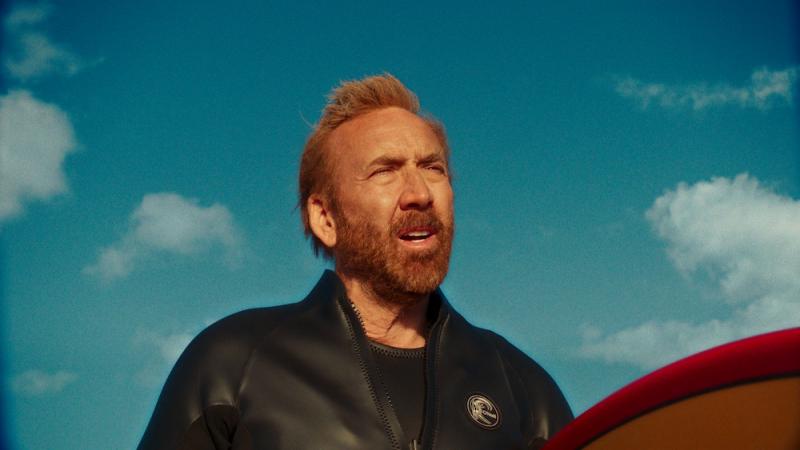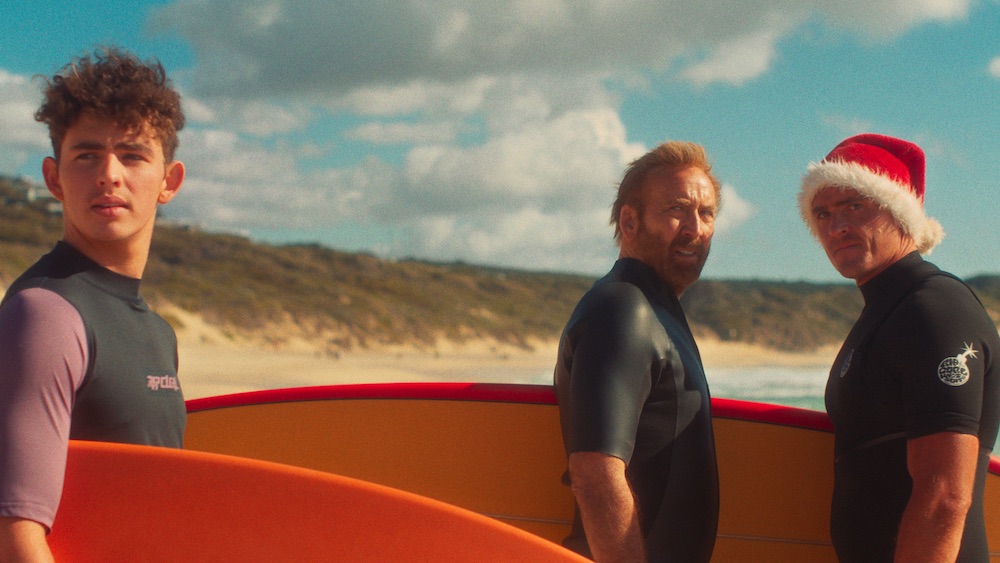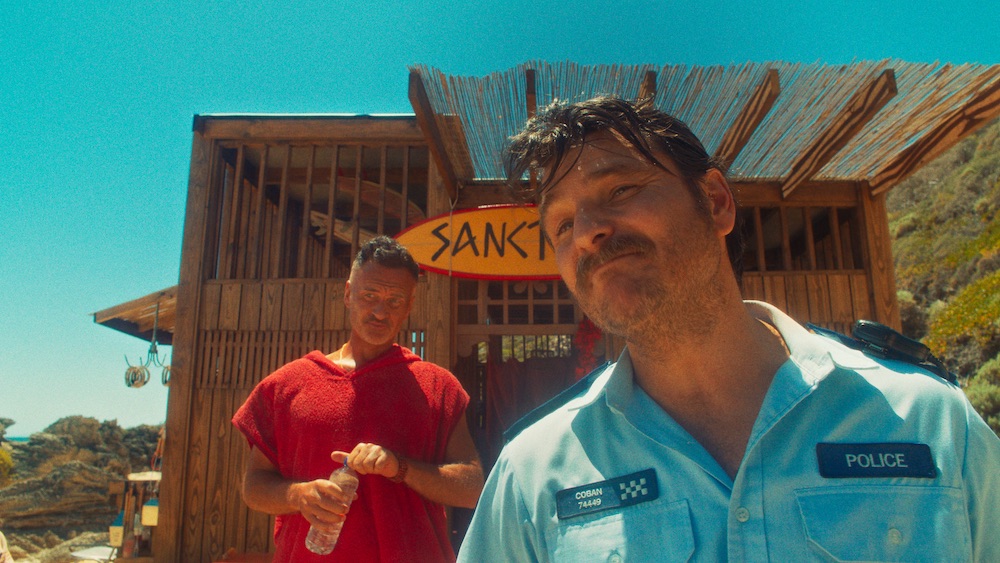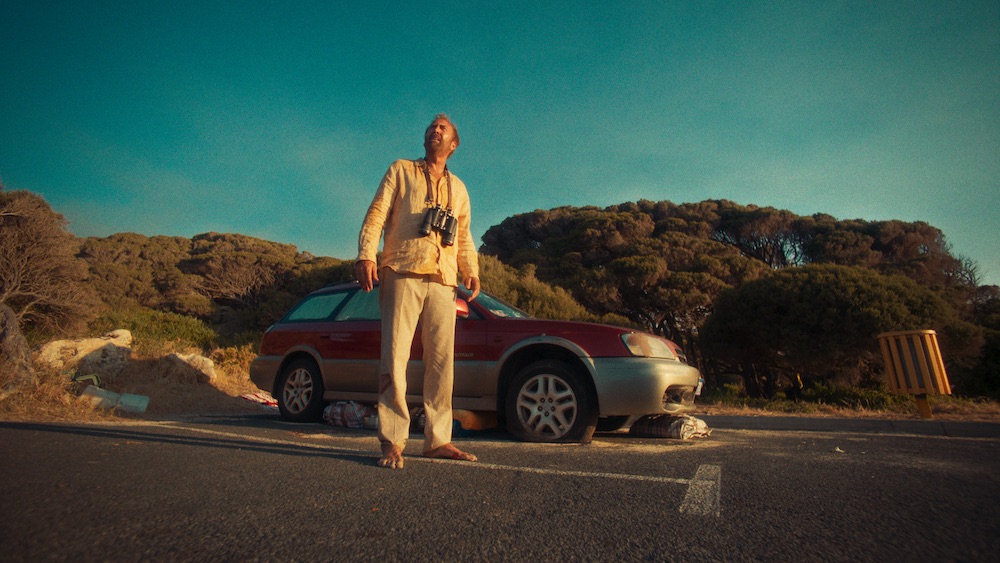The Surfer review - Nicolas Cage is relentlessly down and out in western Australia | reviews, news & interviews
The Surfer review - Nicolas Cage is relentlessly down and out in western Australia
The Surfer review - Nicolas Cage is relentlessly down and out in western Australia
Irish director Lorcan Finnegan's manic take on macho surfer culture

“Don’t live here, don’t surf here,” is the menacing motto (sounds more scary with an Australian accent) of the tanned, muscular denizens of Luna Bay beach. But the unnamed hero known as The Surfer, played by Nicolas Cage, isn’t listening.
The Surfer is directed by Lorcan Finnegan (Vivarium, 2019; Nocebo, 2022) and written by Thomas Martin (both are Irish). They were inspired, says Finnegan, by John Cheever’s The Swimmer as well as Australian New Wave movies of the 70s. This film is, however, not big on subtlety and has a limited scope. It’s shot in Yallingup, Western Australia on a beach and a shade-less car park. Kangaroos, kookaburras, parakeets and rats shimmer beneath the twisted trees and pitiless skies while the tantalising blue waves break below. And it’s Christmas time.
Beautifully shot by Radek Ladczuk, it looks like a paradise of sorts. But madness and violence lie beneath, as well as large doses of toxic masculinity. It’s like a bad trip that just won’t stop. As Cage’s dangerously dehydrated character spins out in his circle of hell, you long for respite.
 Still, the part is a perfect vehicle for Cage’s brand of OTT emoting. His character’s life is falling apart though at first it seems set on a reasonably successful course. He’s in his Lexus with his teenage son (Finn Little, pictured above left), wanting to show him the bay where he was born (Cage's character grew up partly in California, which explains the lack of an Aussie accent, and chased waves around the world for a while. We never actually see The Surfer surfing, by the way).
Still, the part is a perfect vehicle for Cage’s brand of OTT emoting. His character’s life is falling apart though at first it seems set on a reasonably successful course. He’s in his Lexus with his teenage son (Finn Little, pictured above left), wanting to show him the bay where he was born (Cage's character grew up partly in California, which explains the lack of an Aussie accent, and chased waves around the world for a while. We never actually see The Surfer surfing, by the way).
He’s desperate to return to his roots, even though his childhood was mired in tragedy, and is in the process of buying a spiffy beach-front house – the house where he grew up, in fact - though he’s separated from his wife. “I’ve been working my whole life to get back here,” he says. His son looks unimpressed. “I should be in school, dad.”
They try to head down to the beach with their boards but hostile locals, led by Scally (Julian McMahon) clad in a strange red-hooded onesie – he’s one of the only characters with a name - surround them. Access denied. Things turn nastier. “This is a public beach,” he protests. “Yeah, but nah,” is the reply. “You don’t belong here any more.” The son goes home, but Cage’s character cannot leave the parking lot. A kind of one-man exterminating angel, there he stays, on and on, day after day – well, two or three, but it feels longer - as his life crumbles around him.
 Gradually he loses everything as the Bay Boys torture and rob him. The first thing to go is his surfboard, and he calls the police. A cop (Justin Rosniak, pictured above with McMahon as Scally) arrives in a bright yellow police car but he’s as menacing as the surfer dudes and is plainly on their side. It's a cult, with everyone congregating in a beach shack where strange male rituals involving branding take place and chants of “Suffer, surfer,” ring out.
Gradually he loses everything as the Bay Boys torture and rob him. The first thing to go is his surfboard, and he calls the police. A cop (Justin Rosniak, pictured above with McMahon as Scally) arrives in a bright yellow police car but he’s as menacing as the surfer dudes and is plainly on their side. It's a cult, with everyone congregating in a beach shack where strange male rituals involving branding take place and chants of “Suffer, surfer,” ring out.
The only dissenter is a bearded old bum (Nicholas Cassim) who also hangs out in the car park, living in his beat-up red Subaru (all the colours are hyper-vivid) with a bullet hole through the windscreen. He’s obsessed with the death of his son, who was a champion surfer, and he blames the cult for it, as well as for the death of his dog.
 But is Cage’s character morphing into the old man? After his phone, his expensive watch, his shoes and his car disappear, he’s in a very similar state. The cop persuades him that the Subaru is his, that he never had a Lexus, that he’s a homeless loser. He no longer knows who he is, but it’s not a very convincing premise and this hallucinogenic section goes on far too long. Though a rat-eating scene may go viral among Cage super-fans.
But is Cage’s character morphing into the old man? After his phone, his expensive watch, his shoes and his car disappear, he’s in a very similar state. The cop persuades him that the Subaru is his, that he never had a Lexus, that he’s a homeless loser. He no longer knows who he is, but it’s not a very convincing premise and this hallucinogenic section goes on far too long. Though a rat-eating scene may go viral among Cage super-fans.
There’s a glimpse of sanity in the form of a kind woman photographer (Miranda Tapsell) who jump-starts his car before his life goes haywire and who reappears when madness has taken over. He can hardly believe she’s real when she offers him her bottle of clean water, by now an unimaginable luxury. “I have a car, I have a job,” he gasps, when she shows him the picture she took of him a few days previously on her phone.
The final conflagration is as excessive as what’s gone before. But Nicolas Cage – “All I want is to take my son surfing” – has an intensity that breaks the mould and that’s just about reason enough to watch.
rating
Explore topics
Share this article
The future of Arts Journalism
You can stop theartsdesk.com closing!
We urgently need financing to survive. Our fundraising drive has thus far raised £49,000 but we need to reach £100,000 or we will be forced to close. Please contribute here: https://gofund.me/c3f6033d
And if you can forward this information to anyone who might assist, we’d be grateful.

Subscribe to theartsdesk.com
Thank you for continuing to read our work on theartsdesk.com. For unlimited access to every article in its entirety, including our archive of more than 15,000 pieces, we're asking for £5 per month or £40 per year. We feel it's a very good deal, and hope you do too.
To take a subscription now simply click here.
And if you're looking for that extra gift for a friend or family member, why not treat them to a theartsdesk.com gift subscription?
more Film
 Oslo Stories Trilogy: Sex review - sexual identity slips, hurts and heals
A quietly visionary series concludes with two chimney sweeps' awkward sexual liberation
Oslo Stories Trilogy: Sex review - sexual identity slips, hurts and heals
A quietly visionary series concludes with two chimney sweeps' awkward sexual liberation
 Sorry, Baby review - the healing power of friendship in the aftermath of sexual assault
Eva Victor writes, directs and stars in their endearing debut feature
Sorry, Baby review - the healing power of friendship in the aftermath of sexual assault
Eva Victor writes, directs and stars in their endearing debut feature
 Blu-ray: Who Wants to Kill Jessie?
Fast-paced and visually inventive Czech comedy
Blu-ray: Who Wants to Kill Jessie?
Fast-paced and visually inventive Czech comedy
 Oslo Stories Trilogy: Love review - freed love
Gay cruising offers straight female lessons in a heady ode to urban connection
Oslo Stories Trilogy: Love review - freed love
Gay cruising offers straight female lessons in a heady ode to urban connection
 Beating Hearts review - kiss kiss, slam slam
Romance and clobberings in a so-so French melodrama
Beating Hearts review - kiss kiss, slam slam
Romance and clobberings in a so-so French melodrama
 Materialists review - a misfiring romcom or an undercooked satire?
Writer-director Celine Song's latest can't decide what kind of film it is
Materialists review - a misfiring romcom or an undercooked satire?
Writer-director Celine Song's latest can't decide what kind of film it is
 theartsdesk Q&A: actor Leonie Benesch on playing an overburdened nurse in the Swiss drama 'Late Shift'
The Guildhall-trained German star talks about the enormous pressures placed on nurses and her admiration for British films and TV
theartsdesk Q&A: actor Leonie Benesch on playing an overburdened nurse in the Swiss drama 'Late Shift'
The Guildhall-trained German star talks about the enormous pressures placed on nurses and her admiration for British films and TV
 Freakier Friday review - body-swapping gone ballistic
Lindsay Lohan and Jamie Lee Curtis's comedy sequel jumbles up more than their daughter-mother duo
Freakier Friday review - body-swapping gone ballistic
Lindsay Lohan and Jamie Lee Curtis's comedy sequel jumbles up more than their daughter-mother duo
 Eight Postcards from Utopia review - ads from the era when 1990s Romania embraced capitalism
Radu Jude's documentary is a mad montage of cheesy TV commercials
Eight Postcards from Utopia review - ads from the era when 1990s Romania embraced capitalism
Radu Jude's documentary is a mad montage of cheesy TV commercials
 The Kingdom review - coming of age as the body count rises
A teen belatedly bonds with her mysterious dad in an unflinching Corsican mob drama
The Kingdom review - coming of age as the body count rises
A teen belatedly bonds with her mysterious dad in an unflinching Corsican mob drama
 Weapons review - suffer the children
'Barbarian' follow-up hiply riffs on ancient fears
Weapons review - suffer the children
'Barbarian' follow-up hiply riffs on ancient fears

Add comment